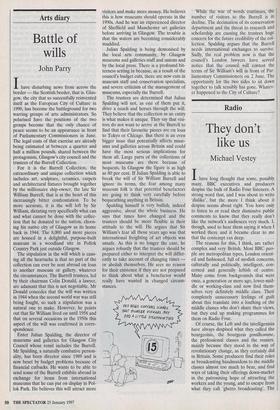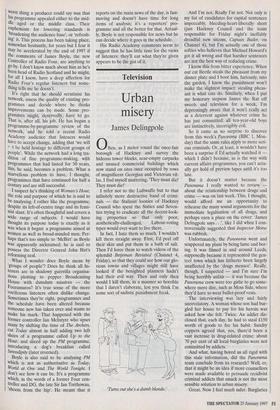Radio
They don't like us
Michael Vestey
Ihave long thought that some, possibly many, BBC executives and producers despise the bulk of Radio Four listeners. A strong word that, and I was about to write `dislike', but the more I think about it despise seems about right. You have only to listen to or read their dismissive public comments to know that they really don't like the network's audiences very much. I, though, used to hear them saying it when I worked there and it became clear to me that the contempt ran deep.
The reasons for this, I think, are rather complex and very British. Most BBC peo- ple are metropolitan types, London orient- ed and fashioned, full of modish concerns, culturally and politically, intelligent, con- cerned and generally leftish of centre. Many come from backgrounds that were once, a generation or more ago, lower-mid- dle or working-class and now find them- selves very definitely middle class. Their completely unnecessary feelings of guilt about this translate into a loathing of the middle classes who don't share their views, but they end up making programmes for them on Radio Four.
Of course, the Left and the intelligentsia have always despised what they called the bourgeoisie, the bourgeois gentilhomme, the professional classes and the rentiers, mainly because they stood in the way of revolutionary change, as they certainly did in Britain. Some producers find their roles as broadcasting handmaidens to the middle classes almost too much to bear, and find ways of taking their offerings down-market in the patronising hope of attracting the workers and the young, and to escape from what they call 'ghetto broadcasting'. The worst thing a producer could say was that his programme appealed either to the mid- dle aged or the middle class. Their euphemism for lowering standards is broadening the audience base', or 'refresh- ing' it. This process has been taking place, somewhat hesitantly, for years but I fear it may be accelerated by the end of 1997 if the comments of James Boyle, the new Controller of Radio Four, are anything to go by. I don't know much about him as he's been head of Radio Scotland and he might, for all I know, have a deep affection for Radio Four's regular listeners but some- thing tells me he doesn't.
It's right that he should scrutinise his network, assess the quality of existing pro- grammes and decide where he thinks improvements can be made. Some pro- grammes might, deservedly, have to go. That is, after all, his job. He has begun a programme-by-programme review of the network, and he told a recent Radio Academy audience that listeners would have to accept change, adding that 'we will r 1 be held hostage to different groups of People'. While the network had a long tra- dition of fine programme-making, with programmes that had lasted for 50 years, this, he said, becomes a problem. What a marvellous problem to have, I thought, programmes that have continued for half a century and are still successful.
I suspect he's thinking of Woman's Hour, the role and purpose of which he is said to be analysing. I rather like the programme, despite its left-of-centre tinge and its femi- nist slant. It's often thoughtful and covers a wide range of subjects. I would have thought its purpose today is exactly as it was when it began: a programme aimed at women as well as broad-minded men. Per- haps that's too simple to ‘McBire as Boyle was apparently nicknamed; he is said to possess the Director General John Birt's reforming zeal.
What I wonder does Boyle mean by `groups of people'? Does he think all lis- teners are in shadowy guerrilla organisa- tions plotting to pepper Broadcasting House with dumdum missives — the Fouramaros? It's true some of the more vociferous listeners often dislike change. Sometimes they're right, programmes and the schedule have been altered because someone new has taken over and wants to make his mark. That happened with the former controller Ian McIntyre who upset many by shifting the time of The Archers, cut Today almost in half adding two left shoes of a programme called Up to the Hour, and sliced up the PM programme, introducing a dog's breakfast called Serendipity (later reversed).
Boyle is also said to be analysing PM which is not as authoritative as Today, World at One and The World Tonight. I don't see how it can be. It's a programme which, in the words of a former Four con- troller and DG, the late Sir Ian Trethowan, `shoots from the hip'. He meant that it reports on the main news of the day, is fast- moving and doesn't have time for long items of analysis; it's a reporters' pro- gramme and all the better for that. Actual- ly, Boyle is not responsible for news but he can decide where it goes in the schedule.
His Radio Academy comments seem to suggest that he has little time for the views of listeners: they'll eat what they're given appears to be the gist of it.



































































 Previous page
Previous page